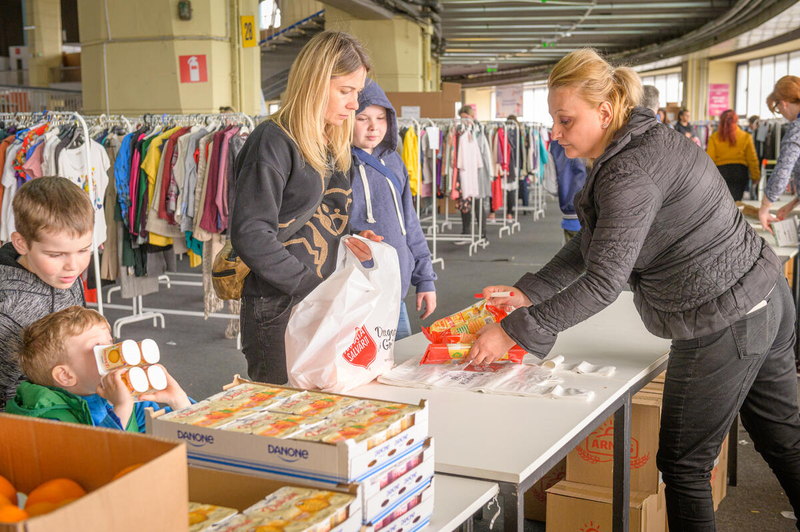Global aid organization warns of increased resentment toward Ukrainian refugees unless changes are made immediately
Media Contact :
August 4, 2022
Senior Public Relations Manager
[email protected]
m 404-735-0871
Media Contact :
August 4, 2022
Senior Public Relations Manager
[email protected]
m 404-735-0871

BUCHAREST (August 4, 2022) — In a new report, global humanitarian organization World Vision warns that unless countries hosting Ukrainian refugees change their approaches to integration and support, tensions may degenerate into increased levels of deprivation, xenophobia and violence.
The report, “Warm Welcomes, Lurking Tensions: Important Lessons from the Global South for Countries Hosting Refugees from Ukraine,” cautions that host communities can feel sidelined in responses by aid organizations and local authorities if these are perceived to prioritize refugees for assistance, work, accommodation and services. The research, drawing from case studies in other refugee contexts around the world, shows that this has a damaging effect on the attitudes of host communities, which generally are initially welcoming to refugees but can quickly degenerate unless certain conditions are met. Worryingly, a rise in tensions can lead to increased risk of verbal and physical abuse of children.
World Vision contends that Ukraine’s humanitarian crisis is not unique and that its dynamics are following a pattern seen in places like Lebanon and Bangladesh, where relations between refugees and host communities are currently at their most hostile. The report highlights the following emerging sources of tension:
Charles Lawley, an advocacy, policy and external engagement senior advisor at World Vision and the report’s author, said, “At the beginning of a humanitarian crisis, host communities almost always initially respond with empathy, generosity and willingness to help. Whilst it is true that this tends to erode over time, our research shows that it doesn’t have to, if the response is handled in the right way.”
The report notes that countries hosting Ukrainian refugees can learn from best practices in long-term refugee responses in the Global South. Uganda is one example of a progressive approach to hosting refugees which leads to improved infrastructure that benefits all; ensures interaction between host and refugee communities; supports local trade to strengthen economic resilience for all; and combats false narratives by creating communication campaigns on coexistence, human rights and education about refugees.
“When host countries are not proactive in supporting host and refugee communities and ensuring they integrate, it can lead to increased poverty, xenophobia and even violence,” Lawley added. “Social tensions have previously led to clashes between refugee and host communities in Lebanon, Chile, Kenya and Bangladesh.
“Similar tensions, fueled by an increase in anti-refugee disinformation, are actually at risk of forming in countries responding to the Ukraine crisis. Action must be taken now to avoid further deterioration leading to clashes in the future, especially for the sake of children who often experience violence and discrimination when divisions are allowed to grow.”
The World Vision report states that if refugees in places like Poland, Moldova and Romania— like refugees in Uganda—are immediately able to settle, secure employment, access public benefits such as healthcare and education, and start their own businesses, there will be a significant positive impact on social cohesion. Factors enabling this type of integration, such as refugee registration and the implementation of the Temporary Protection Directive in European Union, need to be facilitated by both government policies and humanitarian actors.
“The distress of sudden displacement that millions of Ukrainian refugees have experienced should not be compounded by facing hostility from the communities accommodating them,” Lawley said. “The international community and relevant decision makers must heed this warning and prioritize social cohesion now. Ukrainian children have suffered enough, and we all have a moral responsibility to ensure that they are allowed to experience long-term peace and happiness in the country they have fled to.”
Currently, more than 14 million Ukrainian people—including two thirds of the country’s children—are displaced from their homes, with 6.5 million having sought refuge in neighboring countries.
World Vision is working directly and through partners to offer comprehensive support to displaced children and families in Ukraine and surrounding countries. According to the latest report, as of June 30 these efforts have reached 153,910 people, including just under 60,000 children. Cash distributions have totaled $889,000, while over 96,000 people have received food assistance and over 12,000 have received temporary shelter assistance.
About World Vision:
World Vision is a Christian humanitarian organization dedicated to working with children, families and their communities worldwide to reach their full potential by tackling the causes of poverty and injustice. With staff in nearly 100 countries, World Vision serves all people, regardless of religion, race, ethnicity or gender. For more information, please visit www.WorldVision.org/media-center/ or on Twitter @WorldVisionUSA.